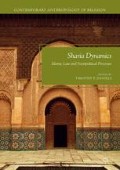Abstract
Fatwa, a legal response by a jurist-consult to concerns raised by the Muslim public, is the “atomic” component of Sharia. Substantive and formal aspects of Islamic law developed historically out of the corpus of fatwas, so they tell a lot about the anatomy of Sharia. This chapter will examine the contemporary fatwas issued by the International Islamic Fiqh Academy, an organization consisting of scholars from across the Muslim world. The fatwas examined here deal with economic issues that have arisen because of Sharia’s encounter with modernity. From these fatwas we can map the reproduction of Sharia in the postcolonial era and, at the same time, measure how Muslims are responding to modern and postmodern challenges.
Access this chapter
Tax calculation will be finalised at checkout
Purchases are for personal use only
References
Al-Ahsan, Abdullah. 1988. The Organization of the Islamic Conference: An Introduction to Islamic Political Institution. Herndon, VA: The International Institute of Islamic Thought.
———. 1992. Ummah or Nation?: Identity Crisis in Contemporary Muslim Society. Leicester, UK: The Islamic Foundation.
Anjum, Ovamir. 2007. Islam as a Discursive Tradition: Talal Asad and His Interlocutors. Comparative Studies of South Asia, Africa and Middle East 27(3): 656–672.
Asad, Talal. 1986. The Idea of an Anthropology of Islam. Occasional Papers Series. Washington, DC: Georgetown University for Contemporary Arab Studies.
———. 2003. Formations of the Secular. Stanford: Stanford University Press.
Hallaq, Wael B. 1997. A History of Islamic Legal Theories: An Introduction to Sunni Usul al-fiqh. New York: Cambridge University Press.
———. 2003–2004. Juristic Authority Vs. State Power: The Legal Crisis of Modern Islam. Journal of Law and Religion 19(2): 243–258.
———. 2004. Can the Shariʻa Be Restored? In Islamic Law and the Challenges of Modernity, ed. Yvonne Yazbeck Haddad, and Barbara Freyer Stowasser, 21–53. Walnut Creek, CA: Altamira Press.
———. 2009. Sharīʻa: Theory, Practice, Transformations. Cambridge: Cambridge University Press.
Hodgson, Marshal. 1974. The Venture of Islam: Conscience and History in a World Civilization, vol I–III. Chicago, IL: University of Chicago Press.
Ihsanoglu, Ekmeleddin. 2010. The Islamic World in the New Century: The Organization of the Islamic Conference. New York: Columbia University Press.
Krygier, Martin. 1986. Law as Tradition. Law and Philosophy 5(2): 237–262.
Lapidus, Ira. 2002. A History of Islamic Societies, 2nd edn. New York: Cambridge University Press.
Layish, Aharon. 2004. The Transformation of the Sharī‘ah from Jurists’ Law to Statutory Law in the Contemporary Muslim World. Die Welt Des Islams 44(1): 85–113.
Mahmood, Saba. 2005. Politics of Piety: The Islamic Revival and the Feminist Subject. Princeton, NJ: Princeton University Press.
Qamar, Abdul al-Qaher Muhammad. 2007. Al-Ijtihad Wa Al-Iftā’ Fi Majma’ Al-Fiqh Al-Islami Al-Duwali. Conference paper presented at Mu’tamar al-‘Ifta’ fi ‘Alam Maftuh: Al-Waqi’ al-Mathil wa al-‘Amal al-Murtaja. Kuwait, May 26–28.
Schulze, Reinhard. 2000. A Modern History of the Islamic World. Trans. Azizeh Azodi. New York: New York University Press.
Vikor, Knut S. 2005. Between God and Sultan: A History of Islamic Law. New York: Oxford University Press.
Voll, John Obert. 1982. Islam: Continuity and Change in the Modern World. Boulder, CO: Westview Press.
Wheeler, Brannon. 1996. Applying the Canon of Islam: The Authorization and Maintenance of Interpretive Reasoning in Hanafi Scholarship. Albany, NY: State University of New York Press.
Author information
Authors and Affiliations
Editor information
Editors and Affiliations
Rights and permissions
Copyright information
© 2017 The Author(s)
About this chapter
Cite this chapter
Awass, O. (2017). Fatwa, Discursivity, and the Production of Sharia. In: Daniels, T. (eds) Sharia Dynamics. Contemporary Anthropology of Religion. Palgrave Macmillan, Cham. https://doi.org/10.1007/978-3-319-45692-8_2
Download citation
DOI: https://doi.org/10.1007/978-3-319-45692-8_2
Published:
Publisher Name: Palgrave Macmillan, Cham
Print ISBN: 978-3-319-45691-1
Online ISBN: 978-3-319-45692-8
eBook Packages: Social SciencesSocial Sciences (R0)

